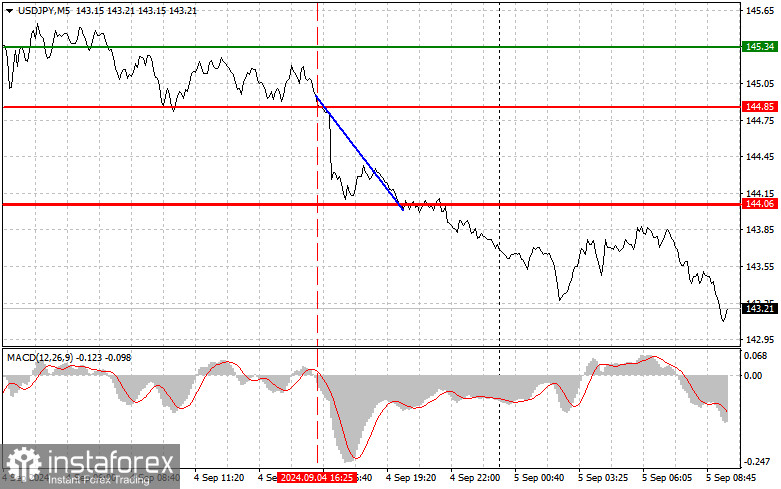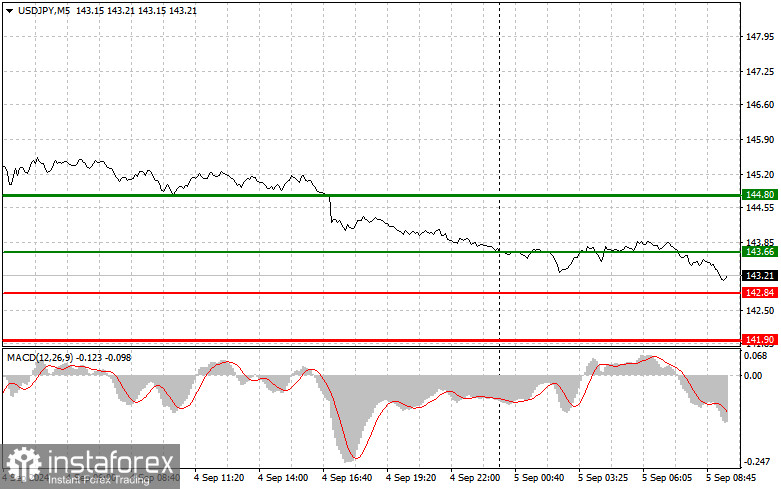Trade Analysis and Tips for Trading the Japanese Yen
The price test of 144.85 occurred when the MACD indicator started to move down from the zero mark, which confirmed the correct entry point for selling the dollar in continuation of the downtrend observed in recent months. As a result, the pair fell by more than 50 pips. Buying on the rebound from 144.06 did not bring much success. During the Asian session, pressure on the dollar persisted. This was linked to a speech by Bank of Japan board member Hajime Takata, who stated the need for another interest rate hike—especially if inflation continues to evolve in accordance with the Bank's forecasts. For this reason, it is better to continue trading in the development of the downtrend, using brief recovery moments of the pair to search for more convenient market entry points. As for the intraday strategy, I will rely more on scenarios No. 1 and 2.

Buy Signal
Scenario No. 1: I plan to buy USD/JPY when it reaches the entry point at 143.66, plotted by the green line on the chart, with the goal of rising to 144.80, plotted by the thicker green line on the chart. In the area of 144.80, I intend to exit long positions and open short positions in the opposite direction, expecting a movement of 30-35 pips from the level. It's unlikely that we can count on the pair rising today. Important: Before buying, ensure the MACD indicator is above the zero mark and starting to rise from it.
Scenario No. 2: I also plan to buy USD/JPY today in case of two consecutive tests of 142.84 when the MACD indicator is in the oversold area. This will limit the pair's downward potential and lead to a reverse market upturn. We can expect growth to the opposite levels of 143.66 and 144.80.
Sell Signal
Scenario No. 1: I plan to sell USD/JPY today only after testing the level of 142.84 plotted by the red line on the chart, which will lead to a rapid decline in the pair. The key target for sellers will be the level of 141.90, where I intend to exit short positions and immediately open long positions in the opposite direction, expecting a movement of 20-25 pips in the opposite direction from that level. Pressure on USD/JPY may return at any moment, since the bearish market for the dollar has not disappeared. Important: Before selling, ensure the MACD indicator is below the zero mark and starting to decline.
Scenario No. 2: I also plan to sell USD/JPY today in case of two consecutive tests of 143.66 when the MACD indicator is in the overbought area. This will limit the pair's upward potential and lead to a reverse market downturn. We can expect a decline to the opposite levels of 142.84 and 141.90.

What's on the Chart:
Thin green line: the entry price at which you can buy the trading instrument.
Thick green line: the estimated price at which you can set Take Profit or manually close positions, as further growth above this level is unlikely.
Thin red line: the entry price at which you can sell the trading instrument.
Thick red line: an estimated price at which you can place Take Profit or manually close positions, as further decline below this level is unlikely.
MACD indicator: when entering the market, it is essential to be guided by overbought and oversold zones.
Important: Novice traders in the forex market need to be very careful when making decisions about entering the market. It is best to stay out of the market before important fundamental reports are released to avoid getting caught in sharp price fluctuations. If you decide to trade during news releases, always place stop orders to minimize losses. You must set stop orders to avoid losing your entire deposit, especially if you don't use money management and trade in large volumes.
Remember, a clear trading plan, like the one I've outlined, is essential for successful trading. Making impulsive decisions based on the current market situation is a losing strategy for novice intraday traders.





















